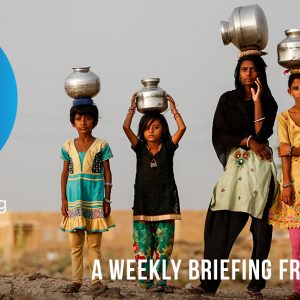Federal Water Tap, December 19: States Slow to Distribute Disaster Aid Funds for Housing
The Rundown
- A GAO report finds that states are slow to distribute federal funds after hurricanes and wildfires that occurred as much as five years ago.
- NOAA recommends $105 million in funding for dam and culvert removal and other projects to aid fish migration.
- NOAA also releases updated data on marine and Great Lakes ecosystem health.
- The Department of Energy is providing grant funding to researchers for ways to decarbonize wastewater treatment.
“We know that inaction is not the answer. And insufficient action will mean serious consequences for the entire basin. Because if a solution is not developed by the basin, Commissioner Touton will figure it out for us. And as much as I enjoy working with the commissioner, I think it’s better for everyone if the federal government doesn’t make these tough decisions.” — Sen. Mark Kelly (D-AZ), addressing the Colorado River Water Users Association conference.
By the Numbers
$25.7 Million: Grant funding available to provide small water systems with technical assistance and training so that the water systems can meet national drinking water standards.
$105 Million: Funding recommended by NOAA for projects to allow fish to move upstream with greater ease. The projects include removing culverts, dams, and weirs, or installing fish ladders.
News Briefs
States Slow to Distribute Disaster Recovery Aid
States that received tens of billions in federal funds to help homeowners rebuild after wildfires and hurricanes in 2017 and 2018 have been slow to distribute the money.
According to a Government Accountability Office report, seven states and territories — California, Florida, North Carolina, Puerto Rico, South Carolina, Texas, and the U.S. Virgin Islands — pledged $11.9 billion for housing assistance. As of July 2022, only 28 percent of the funds had been given out.
The funds came through the Community Development Block Grant Disaster Recovery program.
Studies and Reports
Marine and Great Lakes Ecosystem Health
The number of days that Great Lakes beaches are closed due to contaminated waters is decreasing but in-water heat waves are increasing.
That’s according to the most recent update of NOAA data on marine and Great Lakes ecosystems.
The report, for the first time, displays trends for biological, chemical, and physical changes in the Great Lakes region and for each lake individually.
On the Radar
Comments Due for Colorado River Water Supply Changes
The public comment period closes on December 20 for the Bureau of Reclamation’s effort to (potentially) change water deliveries in the Colorado River basin.
Reclamation posted notice in November that it would assess ways to preserve water levels in lakes Mead and Powell in the next four years. That could mean holding back more water than usual.
Decarbonizing Water Treatment
The Department of Energy has $14 million in grant funding for researchers exploring how to reduce greenhouse gas emissions from wastewater treatment.
There are several application deadlines, the first of which is January 27, 2023.
Federal Water Tap is a weekly digest spotting trends in U.S. government water policy. To get more water news, follow Circle of Blue on Twitter and sign up for our newsletter.
Brett writes about agriculture, energy, infrastructure, and the politics and economics of water in the United States. He also writes the Federal Water Tap, Circle of Blue’s weekly digest of U.S. government water news. He is the winner of two Society of Environmental Journalists reporting awards, one of the top honors in American environmental journalism: first place for explanatory reporting for a series on septic system pollution in the United States(2016) and third place for beat reporting in a small market (2014). He received the Sierra Club’s Distinguished Service Award in 2018. Brett lives in Seattle, where he hikes the mountains and bakes pies. Contact Brett Walton






Leave a Reply
Want to join the discussion?Feel free to contribute!